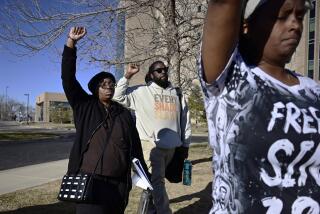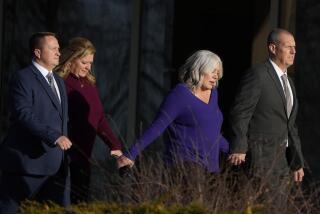Testimony strikes at heart of Jackson doctor’s defense
Michael Jackson could not have given himself the lethal dose of the surgical anesthetic that killed him, a medical examiner who performed the singer’s autopsy testified Tuesday, dealing a blow to the defense argument that the singer died by his own hand.
As the third week of testimony in Dr. Conrad Murray’s involuntary manslaughter case got underway, Dr. Christopher Rogers, an examiner with the L.A. County coroner’s office, testified that it was the words of the defendant that led him to rule out a scenario in which Jackson gave himself the anesthetic propofol. Murray’s attorneys have told jurors scientific evidence will show Jackson caused his own death.
Murray told detectives in an interview that he left the singer’s bedside for about two minutes to go to the bathroom on June 25, 2009, and returned to find his patient had stopped breathing. That window, Rogers said, was not enough for any propofol that Jackson may have taken to take effect.
“The circumstances, from my point of view, do not support self-administration of propofol,” the medical examiner said. “You’d have to assume that Mr. Jackson woke up, although he was at least to some extent under the influence of propofol and other sedatives, he was able to somehow administer propofol to himself.”
It is more likely, given that Murray was treating Jackson with the powerful anesthetic without a precision dosing device, Rogers said, that the doctor had mistakenly administered an excessive amount of the drug. Rogers ruled in his August 2009 autopsy report that Jackson’s death was a homicide.
“I think it would be easy in those circumstances for the doctor to estimate wrong and give too much propofol,” Rogers told jurors Tuesday.
“And some variation of that scenario you find to be more likely?” Deputy Dist. Atty. David Walgren asked.
“Yes,” Rogers responded.
Later, under additional questioning by Walgren, Rogers reiterated his opinion from an earlier hearing that even if it were the case that Jackson himself delivered the fatal dose, the standard of care Murray provided would still have made the death a homicide.
Walgren asked Rogers about the situation Murray left his patient in, with the propofol accessible to Jackson and no monitoring equipment despite the risks associated with the drug.
“Isn’t it true you still deem it a homicide?” the prosecutor asked.
“Yes,” Rogers said.
An attorney for Murray, however, asked Rogers to acknowledge that the quantity of propofol the physician said he gave Jackson could not have resulted in the levels found posthumously in the singer’s blood.
“If Dr. Murray’s telling the truth and slowly infuses 25 milligrams of propofol, you wouldn’t assume it to get nearly those levels would you?” attorney J. Michael Flanagan asked.
“Assuming that is all he infuses, yes,” Rogers replied.
During Rogers’ testimony, Walgren briefly showed jurors an autopsy photo of Jackson’s body looking pale and gaunt. Even though he appeared thin, the singer was of normal weight and above average health for a man 50 years of age, Rogers recounted.
Jurors also on Tuesday heard the rest of Murray’s interview with two detectives recorded two days after Jackson’s death.
Murray stared blankly ahead, expressionless, as he listened to the recording in which he described breaking the news of the star’s death to Jackson’s mother and children. Katherine Jackson broke down weeping, and the singer’s children spent a long time with their father’s body saying goodbye, Murray said in the interview.
Det. Scott Smith, who took Murray’s statement, said on the stand that the interview marked the first time the physician had ever mentioned administering propofol. Paramedics and emergency physicians previously testified that Murray had never told them about the anesthetic.
“That was the first you learned of that?” Walgren asked.
“That was the first time those words were uttered, during the interview,” Smith said.
In cross-examination, defense attorney Ed Chernoff noted that neither Murray nor his attorneys placed any limitations on the interview. Chernoff also asked Smith why Jackson’s residence remained unsecured after the day of Jackson’s death, allowing for others to go through the home before medical evidence of Murray’s treatment of Jackson was recovered four days later.
Smith said the decision was with the coroner’s office, and that “given the circumstances,” he was not surprised the house was not locked down.
Los Angeles Times staff writer Harriet Ryan contributed to this report.
More to Read
The biggest entertainment stories
Get our big stories about Hollywood, film, television, music, arts, culture and more right in your inbox as soon as they publish.
You may occasionally receive promotional content from the Los Angeles Times.







